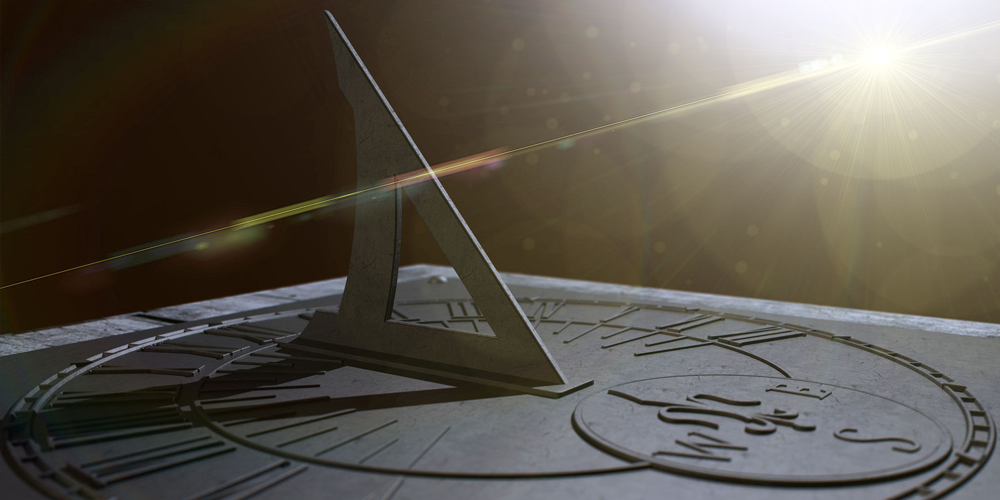You have the ability to change time.
You can change it, because you can think about it, and change the frame. No other creature we know about can do this.
Our ability to think in time is one of the super-powers we are given as human beings. A lizard is perpetually stuck in the now. A complex adult can project their imagination billions of years in either direction.
I’ve been thinking a lot about time-frames recently. I think they have significant implications for our work in the world and the way we go about realizing it.
Let me explain.
The entire expanse of history in a single map
I remember when I first got interested (actually somewhat obsessed) with the work of integral philosopher Ken Wilber. His huge maps of reality saved me during a time of existential soul searching.
One of the huge gifts that I got from his work, was that I started to think about human history in terms of epochs.
Modern humans have been around for about 180,000 years, which is a stupendous amount of time, and hard to grasp. But when it was broken down into a handful of major paradigms, I could start to see the broad strokes of the evolution of human consciousness.
It meant I could now look at the existential conundrums that had been plaguing me inside a huge context. It was not that I now had the answers, but rather that my frustration was dissolved inside a container big enough to hold the questions.
Here’s another example of the power of time-frame manipulation.
The earth has been around a while. It’s hard to grasp just how long. So let’s switch the time-frame.
If the entire 4.5 billion year history of the earth were condensed into a single year, here’s what we see.
Life arrives as single celled bacteria around the beginning of March. And things move pretty slowly for quite some time!
In the middle of November we get the oceans filling up with multi-cell organisms.
At the beginning of December, amphibians venture onto dry land.
On December 13th Dinosaurs arrive on the scene, and stick around until 26th when they’re wiped out. Mammals come along the following day.
It’s not until December 31st that the first hominids (apes on 2 legs) appear.
Modern humans rock up at about 11:35 pm.
And the industrial revolution happens in the last 2 seconds before midnight.
Why are time-frames powerful?
When you change the context of something, you simultaneously change the content.
In other words, change the frame, and you can look at things in a completely different way.
This is definitely true with time-frames.
For example, let’s look at slavery. It can look like a very different issue if I change the time-frame.
If I look at slavery through a 500 year time frame, I will see it as a horrific, barbaric thing that powerful white people did to defenseless black people.
If I look at it through a 180,000 year time frame, I’ll see it as something that is common to every single human culture we know about, regardless of race, until the industrial revolution, when it was outlawed on a mass scale in a relatively short period of time.
When I expand the time frame around a particular topic – when I stretch the edges to increase the canvas – I see a different picture.
What time frame are you thinking about your work in?
The next few hours of urgent to-dos you have to get through?
The remaining few weeks until your next vacation?
The 2 months until your big launch?
The next 10 years as you build your legacy?
The next 10 lifetimes as you unwind your evolutionary destiny?
When I look at my business in the time-frame of the next product launch I’m performing, then success looks like nailing that launch. It looks like hitting the financial targets I have in mind, converting the right number of people into customers, persuading enough people of the value of my offer.
When I look at my business in the time-frame of the next 30 years, it doesn’t matter if the next launch fails. In fact, I’ll learn much more from an abject failure than I will from a success.
When I look at my business in the time-frame of the next 30 years, then I don’t want to persuade as many people as possible to buy my thing, I want to build relationships of intimacy and trust that will have people become customers and partners for decades to come.
Stretch your frame
You’re here for some particular work. It’s your work. It’s your life’s work. What happens if you examine that work in the context of the rest of your life?
When you take things out of the context of financial success during this calendar year, and place them in the context of a lifetime of discovery and growth, what picture can be painted?
Your dreams are big. Too big to hold sometimes. So put them in bigger hands. Put them in a time-frame of the rest of your life. What is possible now?
Or go really creatively out there. Stretch the time frame beyond this life-time.
What would happen to your work, if you knew that the mission would be taken up again, after you die, by a version of you that forgot all your memories, but retains all your implicit learning and ability? How would that change things?
In other words, your work is so important, that you don’t have to rush to nail it all today, or this week, or this year.
You have at least the rest of your life to work on it.
Expand your frame. Give your dreams a big enough field to play in, and your stress a long enough journey to be belittled by.
Now the frame is different.
What picture do you see?





This will bend your frame…
https://www.youtube.com/watch?v=1Eh5BpSnBBw